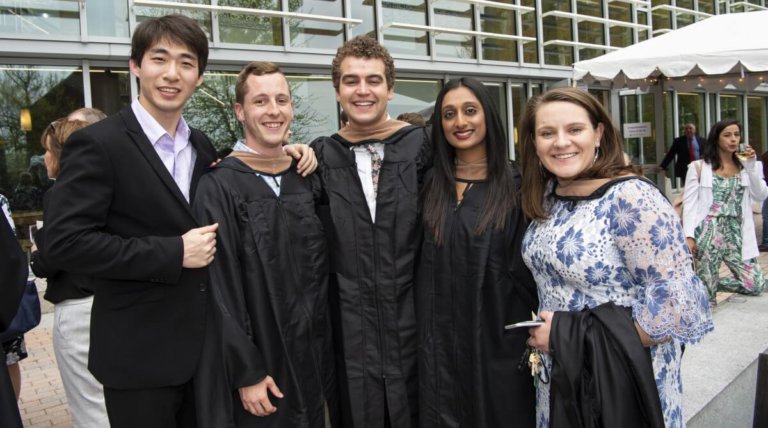
Our tech-driven era is propelling the global economy towards uncharted waters. Businesses need experts who can tackle novel challenges that come with these changes. In some instances, employers are increasingly seeking candidates with specialised academic credentials to ensure they come with the right skills and expertise they need.
The same can be said in the financial sector which is growing increasingly complex with the advancement of technology. For instance, to what extent will new technology such as blockchain and big data affect banks and financial services as a whole? Complex financial problems call for critical and creative thinkers who can navigate and find new ways to solve these issues and evolve with the industry’s future demands.
Graduates and working professionals must be equipped for a new normal, in which an undergraduate degree may not suffice to stand out among the competition. Hence, those who are keen to pursue or to advance their finance careers may want to look into obtaining a Master’s in Finance.
An advanced qualification in finance is the best way to springboard graduates’ careers in the industry. It can provide students with new skills and knowledge to remain competitive, also opening doors to many career opportunities in the future, be it in commercial banking, corporate finance, financial management, or beyond.
Here are four schools to consider if you want to fast-track your career in the finance industry:
PETER T. PAUL COLLEGE OF BUSINESS, UNIVERSITY OF NEW HAMPSHIRE (UNH) – USA

UNH
Located in the northeastern US (just one hour north of Boston’s financial center), UNH’s Peter T. Paul College of Business has cemented its reputation as one of the nation’s most reputable business education providers. It’s an institution known for its high national ranking in The Princeton Review and is one of the five percent of business schools worldwide to hold Association to Advance Collegiate Schools of Business (AACSB) accreditation.
As a student at Paul College, you’ll learn from a faculty with nationally recognised research and real-world business experience, such as Associate Professor of Finance Yixin Liu.
Paul College offers an MSc in Finance (MSF), which trains students to provide solutions to complex financial challenges faced by businesses today. By pursuing the MSF, you’ll build a foundation in financial knowledge, master analytical skills that result in the application of knowledge, and learn to solve complex financial problems.
Under this programme, students can choose from three tracks: investments, financial analytics and “fintech,” or a student-designed track.
The MSF has a STEM designated focus on mathematical finance. Graduates can apply for a 24-month OPT STEM Extension to their 12-month Optional Practical Training Program (OPT) period, allowing international students to work in the US for up to 36 months after graduation with no additional visa requirement. Graduates will be prepared for a range of roles in corporate finance, investment banking and start-up enterprises.
GEORGE WASHINGTON UNIVERSITY SCHOOL OF BUSINESS (GWSB), GEORGE WASHINGTON UNIVERSITY – USA
This private university in the heart of the US capital, Washington DC, has plenty of accolades under its belt – GWSB consistently ranks well among its collegiate competitors, making it a trusted school among graduates and working professionals.
GWSB offers a variety of programmes for graduate students, including MBA, specialised master’s programmes, doctoral, executive education programmes and graduate certificate programmes in a range of disciplines. However, students keen to stand out from the crowd in the finance industry may want to opt for their academic finance programmes, which include the MSc in Finance (MSF), MSF in China, MBA with a Concentration in Finance or the Doctoral Programmes in Finance.
 The MSF programme, which also falls under the STEM branch, focuses on risk management, financial engineering, banking, corporate finance and portfolio analysis. It’s designed to combine quantitative and computer skills with financial theory and applications.
The MSF programme, which also falls under the STEM branch, focuses on risk management, financial engineering, banking, corporate finance and portfolio analysis. It’s designed to combine quantitative and computer skills with financial theory and applications.
Meanwhile, the MSF China programme is unique as it’s jointly offered by GWSB and Renmin University of China International College for Chinese students. The two-year programme delivers the same curriculum as GWSB’s regular two-year MSF programme, but it will be customised for Chinese students.
Stellar programmes aside, becoming a GWSB student entails learning within a central location in close proximity to the White House, international organisations and foreign embassies. Students can also use their free time to immerse themselves in the city’s historical monuments that reflect the country’s rich culture.
DEPARTMENT OF FINANCE, STOCKHOLM SCHOOL OF ECONOMICS (SSS) – SWEDEN
Students looking to obtain an advanced degree in finance from a European school may want to consider SSS – an international business school in Sweden – where you can pursue a graduate programme delivered in English.
The website notes that the MSF programme “combines a rigorous, research-based curriculum with extensive real-world applications and operational skill building”. Students will be taught by an experienced faculty whose expertise span a wide breadth of financial topics. These include modern Capital Markets, Valuation (including options), Fixed Income, and Capital Structure, while electives include Value Investing, Restructuring, Mergers and Acquisitions, Private Equity and International Finance.
Under the programme, students can choose from two specialisations, namely Corporate Finance and Investment Management. Prospective students will be heartened to note that SSS’ MSF is consistently one of the top-ranked programmes in various rankings; the Financial Times ranking of the world’s best masters programs (2018) placed the SSE Finance masters at 18th in the world, making it the top Nordic school represented.
Many of SSS’ finance graduates go on to pursue careers in investment banking, corporate finance, private equity, investment management, consulting, as well as various non-finance positions.

Image courtesy of Juliana Wiklund
ANDERSON SCHOOL OF MANAGEMENT, UNIVERSITY OF CALIFORNIA LOS ANGELES (UCLA) – USA
This business school in Los Angeles, California, offers rigorous programmes that prepare students for the business world and beyond. Here, learners can choose from the MBA/FEMBA/EMBA specialisations, while it also offers the Master of Financial Engineering – a 13-month program that merges quantitative finance theory and principles with up-to-date business practices.
Students who study at this school will be learning from highly experienced and established educators.
The finance faculty are world-renowned; four have held the coveted position of president of the American Finance Association, and since their research is frequently shown in the industry’s most respected publications, their findings have influenced policy and practice worldwide.
Their finance faculty conduct research on topics important to the finance profession, including Mortgage Prepayments: Factors beyond Interest Rate Movements, among many others. Many of their discoveries have helped the banking industry determine interest rates, while faculty members often consult with professional and government organisations.
The school’s faculty’s backgrounds are extensive, covering asset pricing; derivatives; micro-structure; corporate finance; and investment finance, making it an ideal place for students keen on furthering their finance studies.
*Some of the institutions featured in this article are commercial partners of Study International
Liked this? Then you’ll love…
Solve complex financial problems with a Master of Science in Finance
George Washington University School of Business: Staying ahead of the curve







